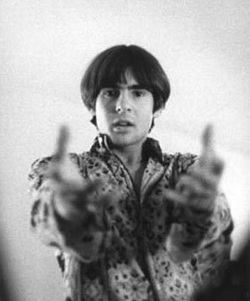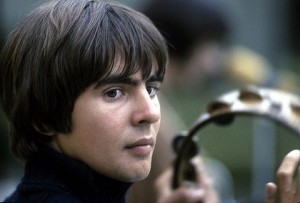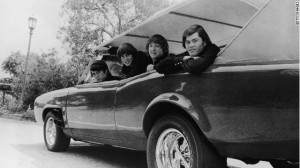-
Featured News
The MC5: A Eulogy
 By Doug Sheppard
And then there were none. Five equals zero. The morning of May 9, 2024, the last surviving member of the MC5, drummer Dennis Thompson, died while recovering from a heart attack—
By Doug Sheppard
And then there were none. Five equals zero. The morning of May 9, 2024, the last surviving member of the MC5, drummer Dennis Thompson, died while recovering from a heart attack— -
Featured Articles
The Beatles: Their Hollywood and Los Angeles Connection
 By Harvey Kubernik
JUST RELEASED are two new installments of the Beatles’ recorded history, revised editions of two compilation albums often seen as the definitive introduction to their work.
Or
By Harvey Kubernik
JUST RELEASED are two new installments of the Beatles’ recorded history, revised editions of two compilation albums often seen as the definitive introduction to their work.
Or -
Davy Jones 1945-2012

David Thomas “The Manchester Cowboy” Jones’ first love was jockeying, a fitting choice for the height-challenged heartthrob, until the stage called him. A later American promo tour for Oliver! fated him with the divinity to appear on the Ed Sullivan Show the monumental date of February 9, 1964. From side-stage a teenaged Jones was bewitched by the Beatles making their American debut and found truly what pie he was a piece of.
Of the Monkees remarked Davy they were a “good garage band,” and perhaps that’s what endears them to UT readers, even those not hip to poppin’ bubblegum. While some of the Prefab Four later divorced themselves from the entity due to its synthetic, machine-made product value, Jones trudged along living and singing the hell out of those hits until he tragically left us. Those inescapable jams of childhood made me a believer, and I shall be to until the day I expire. Godspeed, King of the Wild Tambourine.
Below Michael Lynch pours his Monkee-lovin’ heart out, and a playlist to partake in compiled from Michael’s references and a few of my own. (jeremy nobody, esq.)
The short Monkee. The English Monkee. The cute Monkee. The one who got the girls. The one who played tambourine. The one who later called on Marcia Brady. However people remember Davy Jones, the point is, everybody will remember him.
An all-around entertainer, Davy already had racked up some success as an actor before Screen Gems made a Monkee out of him, most notably his Tony-nominated portrayal of the Artful Dodger in the Broadway production of Oliver! The success of Oliver! led him to try milking his teen appeal through American television guest spots (Ben Casey and Farmer’s Daughter) and, of course, records. 1965 yielded an album, David Jones, and three singles for Colpix, only one of which (“What Are We Going to Do”) charted, and at only #93. His luck changed that autumn when he was chosen as one of the stars of an impending sitcom about “four insane boys.”
On the surface, the seemingly gentle Davy may have appeared to be the most conservative of the four Monkees, alongside the rebellious Michael Nesmith, the hippie-minded Peter Tork, and the delightfully daffy Micky Dolenz. The heavy percentage of lighter love songs that made up his share of Monkees
contributions doesn’t exactly challenge that belief. However, it was Davy who penned the blatantly anti-Vietnam gem “War Games.” It was Davy on the 1968 Grammys who, after the reading the nominations for Best Documentary Recording punctuated the mention of “Open Letter to My Teenage Son” with “I hope it doesn’t win.” And when the Monkees took us into the exotic psychedelic sea of sound known as “Porpoise Song,” Davy, despite being a thousand nautical miles from his usual style of song, added some colorful backing vocals to Micky’s lead as if to say “I’m with ya, mate.”
In fairness, the songs Davy sang covered quite a bit of stylistic ground. Sure, he sang the pretty ballads like “It’s Nice to Be With You” and “Dream World,” but he also tackled the impossible-not-to-dance-to “She Hangs Out” and “99 Pounds.” He could be whimsical, too, on his own compositions “French Song” and “Time and Time Again.” Davy even let slip his own thoughts of Monkee fame, first in “Ceiling in My Room,” wherein he questions its worth, and later in “You and I,” where he expresses concern over it fading away.
Davy sang. He danced. He acted. He did comedy shtick. He played the charming host when needed. He wrote. He produced. In short (no pun intended), Davy incorporated his upbringing as ‘all-around entertainer’ into the Monkees, and the impressive results made the five-feet three-inch Jones stand rather tall among his peers.
– Michael Lynch

